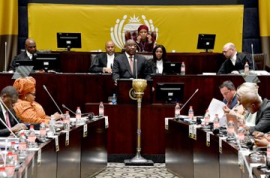
President Cyril Ramaphosa has announced that government has made progress in preparation for the implementation of the National Health Insurance (NHI).
Speaking in the National Assembly on Wednesday, the President reiterated that the achievement of affordable universal health care is vital for improving human health, reducing inequality and enabling South Africans to live more productive lives.
He said a major milestone towards this goal has been achieved with the adoption of the National Health Insurance Bill by the Portfolio Committee on Health, which will soon be debated in the National Assembly.
“Progress is being made in preparation for the implementation of the NHI, including interventions to improve the quality of public and private health care and the roll-out of the electronic patient registration system across public health facilities.
“The implementation of the NHI will be a momentous step towards achieving universal health coverage and creating a society built on justice, fairness, and social solidarity. Let us embrace this opportunity to create a healthier, more equitable future for all South Africans,” the President said.
President Ramaphosa further commended the Members and staff of the Portfolio Committee who have worked hard to process the legislation. He thanked all the organisations and individuals who made submissions and all those who participated in public hearings.
“As the NHI Bill is finalised through the legislative process and as it is implemented, we are determined to ensure that it both fulfils its goal of universal access to quality health care and builds on the significant capabilities of the public and private health sectors… We are determined that the implementation of the NHI effectively tackles inequality in health care in a sustainable manner,” the President said.
Water provision challenges
Turning to the water challenges in the country, President Ramaphosa said this highlights the broader challenge of dysfunction in many municipalities.
This is in the wake of an outbreak of cholera in Hammanskraal in Gauteng and in the Free State.
The President bemoaned the situation, saying that when citizens are exposed to conditions that imperil their right to safe drinking water, it is the worst affront to human dignity.
He reiterated that his thoughts and prayers are with the families of those who lost their lives. He wished those who remain hospitalised a speedy recovery.
“The Department of Water and Sanitation will continue its ongoing engagements with municipal managers, technical staff, mayors and councillors in districts to address this issue and provide support where it is required.
“We need to strengthen local government by separating the administration from undue political influence. For example, the appointment process of officials, such as the municipal manager and chief financial officer, could involve competence verification by national departments like Cooperative Governance and National Treasury. This would help to ensure that people with the right skills and experience are appointed,” he said.
While an investigation is still underway into the source of the outbreak, the President said that cholera thrives in conditions where there is inadequate access to clean water and sanitation facilities.
He said the people of Hammanskraal have had to put up with water supply challenges for over a decade and unfortunately, their plight is not an isolated one.
Two years ago, the sixth administration reinstated the Blue Drop and Green Drop water quality monitoring system to monitor the country’s water quality.
The President said this would enable stronger intervention in municipalities that fail to meet the minimum norms and standards for water service delivery.
Last year’s Green Drop report pointed to serious challenges in municipalities when it comes to managing water resources.
It highlighted that municipalities are underspending or not even utilising critical grants to upgrade and maintain social infrastructure like water treatment facilities. – SAnews.gov.za


